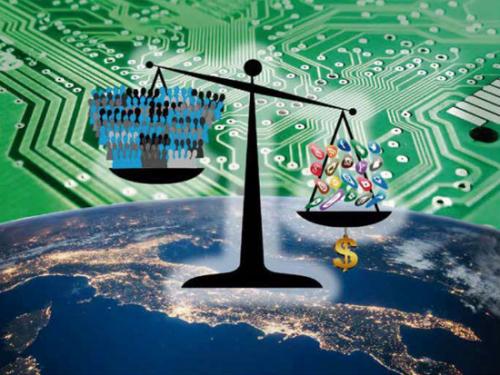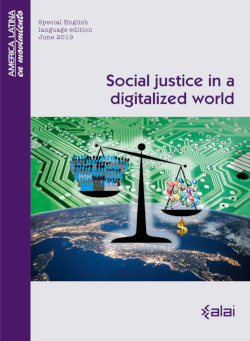Towards digital justice
Digital megacorporations are extending their tentacles to areas that were previously public or common goods, which has unleashed a process of monopolization on an unprecedented scale.
- Opinión

| Article published in ALAI’s magazine No. 542: Social justice in a digitalized world 24/06/2019 |
The speed of penetration and ubiquitous reach of digital technologies in society is unprecedented. Such numerous and varied applications, many of which are extremely useful or simply captivating, in just a few years have become almost indispensable, sometimes even addictive, which has led to their widespread though uncritical usage.
This came about largely due to the establishment, early in this century, of a dominant internet business model based on appropriating and monetizing data, which motivated huge investments in the sector, with the potential for colossal profits. Although it did contribute to mass access, it was at the cost of subjecting the user population to a growing dependence on the big digital monopolies, even in some of the most intimate aspects of their lives. Today, the great majority of interactions that are carried out with digital support go through the platforms controlled by one or another of these monopolies, whose names are already household words: Google, Facebook, Amazon...
Taking advantage of the absence of regulation and the inaction of legislative bodies and authorities, these companies have been able to exploit, without restriction, a practically free and unlimited input: digitally generated data. With this input, by means of algorithms (programs that analyze and order the data), they create profiles of their users that they then sell, mainly to advertisers. Targeted advertising according to the profile of each user gives them an advantage over traditional media, a fact which has enabled them to dominate the advertising market. A recent study estimates that in 2018, in advertising in news sources alone, Google has invoiced US$ 4.7 billion, equivalent to 81% of the advertising income of the U.S. media industry in the same year.
Data are also the input for an infinite number of new applications of artificial intelligence (that is, algorithms with learning capacity and predictive analysis1). These are used for surveillance and security purposes, for governance functions (such as taxation or traffic management), for transforming productive processes (automation, robotics, productivity control of each worker); for trade and services (such as Amazon, Uber); for political-electoral campaigns, health diagnostics, new lethal weapons and a long etcetera. Meanwhile, digital technology is being integrated with other areas of technological transformation, such as genetics or climate engineering, and contributes to accelerating its development.
Many of these uses have obvious benefits for users and society, hence their wide acceptance. However, we are also seeing new evidence of shady, non-transparent, manipulative uses; cases of massive abuse of privacy, of false information becoming viral, against which the population is largely unprotected. However, beyond whether usages are beneficial or harmful, a fundamental problem is how current technological development allows private companies to extend their tentacles to areas that were previously public or common goods, which, particularly in the case of digital megacorporations, has unleashed a process of monopolization on an unprecedented scale.
Yet all of this is still small-scale in comparison with what is to come. A race is underway to digitalize more and more areas of the economy and society, to introduce the internet of things (IoT), 5G connectivity (the technological basis for IoT) and to fine-tune artificial intelligence to span more and more areas. Whoever dominates the digital economy will largely dominate the economy itself. Even more seriously, without proper measures of regulation and control of these corporations, we are on our way to societies under constant surveillance in all spheres, both public and private, facilitated by an infinite number of cameras, microphones, sensors, antennas and other intelligent devices, intercommunicated with each other and with the owners of the technology, by means of opaque algorithms. If we continue along this path, democracy itself is in danger.
This is also the context of the present face-off, mainly between the United States and China, to achieve dominance in digital technology, because whoever prevails will set the standards and gain an advantage in the market. On the one hand, both China and Russia have opted to create their own internal internet (based on a model similar to Silicon Valley), largely to block the dangers of US surveillance and intrusion or an eventual cyberwar, though also for their own surveillance purposes. On the other hand, China, in particular, is investing heavily in e-commerce and artificial intelligence and the new 5G technology, with which it has gone out to conquer world markets. The backdrop to the current US-China trade and tariff war is Chinese superiority in 5G technology, which explains the US response to try to block the advance of the Huawei corporation.
Visions in dispute
This evolution was not – and is still not – inevitable. The internet still has a significant component of citizen initiative and innovation, which generates spaces of freedom, horizontality, distributed and decentralized technology. With greater public investment and regulations aimed at defending the public interest, with greater citizen control, the dispute between this citizen-based vision and the business vision could achieve a better balance. However, in the current phase of predominance of neoliberal capitalism and financial power, this does indeed seem unlikely.
Now, belatedly, several governments and legislatures are realizing that a monster has been created and are trying to curb it. It will not be easy, given the enormous power of digital corporations, and it is essential to have widespread and active citizen participation in the conception and development of solutions; otherwise, these could end up being worse than the problem they aim to solve. The new European regulation on data protection is an interesting step in this direction, and it is significant that most Latin American countries are following this model for their own legislation on the matter (even if it is mainly to facilitate trade with Europe). The Internet Civic Framework (Marco Civil de Internet) that Brazil adopted in 2014, with citizen input, is also considered paradigmatic in terms of internet rights.
Against this backdrop, it is urgent to identify the challenges to social justice in hyper-digitalised societies, especially now that the corporate model is predominant. Its implications cover all areas, such as employment, agriculture, health, education, science, the media, democratic life, among others. This agenda needs to be inter-sectoral, with participation of the different actors involved.
Sally Burch, a British-Ecuadorian journalist, is executive director of ALAI.
* Introductory article to ALAI’s magazine on “Social justice in a digitalized world” (América Latina en Movimiento, No. 542, June 2018 – special English edition), that includes reflections on issues that were presented and interchanged at the Workshop on "Equity and social justice in a digital world: An intersectoral dialogue for a digital justice agenda" (Bangkok, 25-27 March 2019), convened by the Just Net Coalition, Our World is Not for Sale (OWINFS) and Focus on the Global South.
1 Predictive analysis uses historical data to predict future events; a method with obvious limitations and the risk of reinforcing biases already present in society.
Del mismo autor
- Which digital future? 27/05/2021
- ¿Cuál futuro digital? 28/04/2021
- Desafíos para la justicia social en la era digital 19/06/2020
- É hora de falar de política de dados e direitos econômicos 06/04/2020
- Es hora de hablar de política de datos y derechos económicos 01/04/2020
- It’s time to talk about data politics and economic rights 01/04/2020
- 25 de enero: Primer día de protesta mundial contra la 5G 23/01/2020
- January 25: First global day of protest against 5G 23/01/2020
- « En défense de Julian Assange » 02/12/2019
- "En defensa de Julian Assange" 29/11/2019
Clasificado en
Comunicación
- Jorge Majfud 29/03/2022
- Sergio Ferrari 21/03/2022
- Sergio Ferrari 21/03/2022
- Vijay Prashad 03/03/2022
- Anish R M 02/02/2022
Internet ciudadana
- Nick Bernards 31/03/2022
- Paola Ricaurte 10/03/2022
- Burcu Kilic 03/03/2022
- Shreeja Sen 25/02/2022
- Internet Ciudadana 16/02/2022

